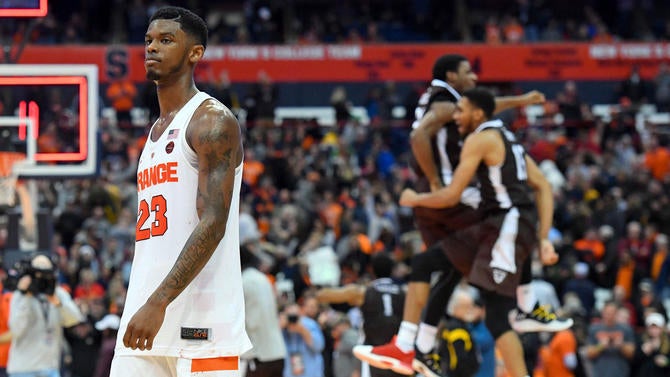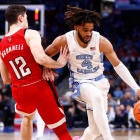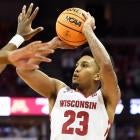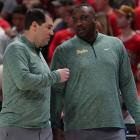Every few days, for more than a month now, some college basketball program somewhere has released, at the very least, the non-league portion of its upcoming schedule. What you'll find, if you take the time to look at them, is that traditional mid-majors continue to have little success when it comes to scheduling home-and-home series with power-conference programs.
Loyola-Chicago's situation got some attention last month.
Porter Moser, fresh off a trip to the Final Four, told CBS Sports' Matt Norlander he "had a little more optimism" that he'd be able to land a high-profile series this season given that his team, and Sister Jean, were among the biggest stories of the 2018 NCAA Tournament. But that optimism quickly faded when Moser failed to land a single home-and-home series with any power-conference schools. The best he could do is accept a check from Maryland for a one-off game -- i.e., a buy game -- against the Terrapins in Baltimore.
"Here I am, a Final Four team, getting bought," Moser said.
Now this is the place in the column where some writers would spend the next 500 words explaining how unfair this is for Loyola-Chicago and schools like Loyola-Chicago. And, to be clear, on that point, I agree. Power-conference schools largely refusing to give mid-majors a level playing field makes getting an at-large bid from any conference other than the ACC, Big Ten, Big 12, Pac-12, SEC, Big East or American difficult bordering on impossible (for just about everybody except Gonzaga). For instance, last season, only three schools from outside of a top-seven league received at-large bids. The other 33 went to programs from either the ACC, Big Ten, Big 12, Pac-12, SEC, Big East or American.
So, yeah, I agree it's unfair.
But spending more than a few sentences on that is about as pointless as screaming about an elected official lying on Twitter everyday. You can call him on it. You can try to shame him. But, ultimately, it does not matter and nothing changes. Same thing with non-league scheduling. Mid-major coaches, and college basketball pundits, have spent years trying to shame power-conference coaches into scheduling home-and-home series with schools from smaller leagues. But it's never worked because, truth is, it's rarely in their best interest to schedule home-and-home series with schools from smaller leagues. Fans of power-conference schools are typically more enthusiastic about home-and-home series with other power-conference programs. So there's that. And then the other thing working against mid-majors is that it's much easier to get a game between a power-conference program and another power-conference program on relevant television than it is to get a game between a power-conference program and a mid-major program game on relevant television. For proof, consider that Loyola-Chicago's game with Nevada in November will air on ESPNews even though it's a matchup featuring one team that's coming off of a Final Four and another that's coming off of a Sweet 16 and will be ranked in everybody's preseason top-10. A game between any other team coming off of a Final Four, and any other preseason top-10 team, would be given a prime television spot. But Nevada vs. Loyola-Chicago gets ESPNews.

I'm not saying it's right.
I'm just saying it's the world we live in.
So, for those reasons and more, mid-major coaches are never going to be successful trying to annually schedule home-and-home series with power-conference programs. They might get one every once in a while. But, way more often than not, it's going to be a waste of time ending in disappointment.
So what should these mid-major coaches do?
My advice has long been this: Accept reality, swallow your pride and be willing to take games that double as Quadrant 1 opportunities however you can get them. If you have to do a two-for-one series, do a two-for-one series. If you have to be somebody's buy game, be somebody's buy game. Because, come Selection Sunday, the selection committee isn't going to care all that much about how hard you tried to schedule. Its members only care about how many quality wins you have on your resume. And if you don't have enough, you'd better secure your league's automatic bid or else.
There's no real downside to this approach, by the way.
If you take the games and win them, you'll possibly be in a position to secure an at-large bid. And if you lose them, so what? All that would mean is that you'd then need to secure your league's automatic bid to make the NCAA Tournament -- no differently than if you didn't play the games at all. In other words, playing them at least gives you a chance at an at-large bid that otherwise would not exist. And not playing them eliminates any realistic hope.
Mark Schmidt is among those who understands this basic truth.
The St. Bonaventure coach knew he was going to have a good team last season, so he agreed to be a buy game for Syracuse. The Bonnies won that game 60-57 in overtime at the Carrier Dome. And, earlier this summer, Schmidt told me "that's why we got in" the NCAA Tournament. The reason you know he's right is because even with that win, and a 3-3 record in Quadrant 1 games, and an RPI of 24, the Bonnies were still only a No. 11 seed that had to play in the First Four in Dayton.
(Meantime, Oklahoma, with a 6-9 record in Quadrant 1 games, and an RPI of 48, was a No. 10 seed placed in the main bracket. But that's another column for another day.)
Bottom line, calling every power-conference coach you know, asking for a home-and-home series, getting rejected and then complaining has never been an effective strategy for mid-major coaches. Not last decade. Not last year. Not this year. And it won't be next year, either. Again, I'm not saying it's fair. I'm just saying it's true. So a mid-major coach's best bet, if he believes he has a team good enough to compete for an at-large bid, is to do what Schmidt did last season and just take the Quadrant 1 opportunities however you can get them. If that means traveling to Syracuse (or some place like Syracuse) for a one-off game, travel to Syracuse (or some place like Syracuse) for a one-off game. If it means scheduling other quality mid-majors, schedule other quality mid-majors. If it means agreeing to a two-for-one series with a power-conference program, agree to a two-for-one series with a power-conference program.
Just do what you have to do.
Because, otherwise, the system in place gives you no chance.





















